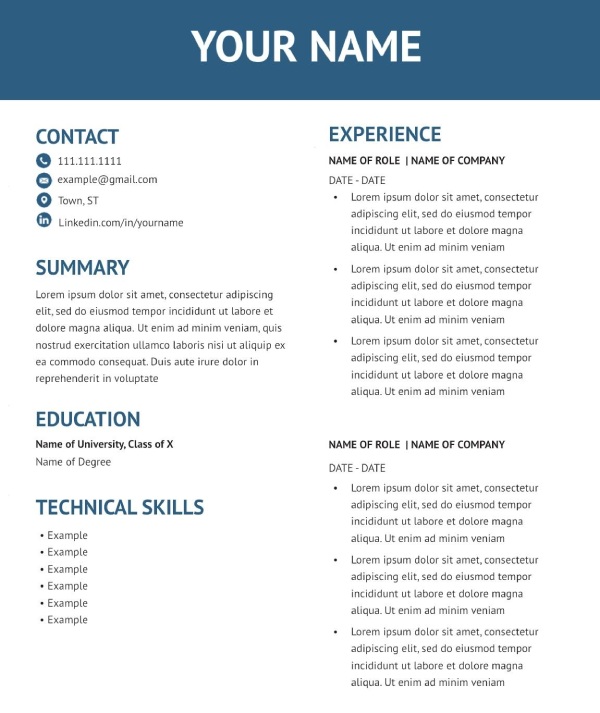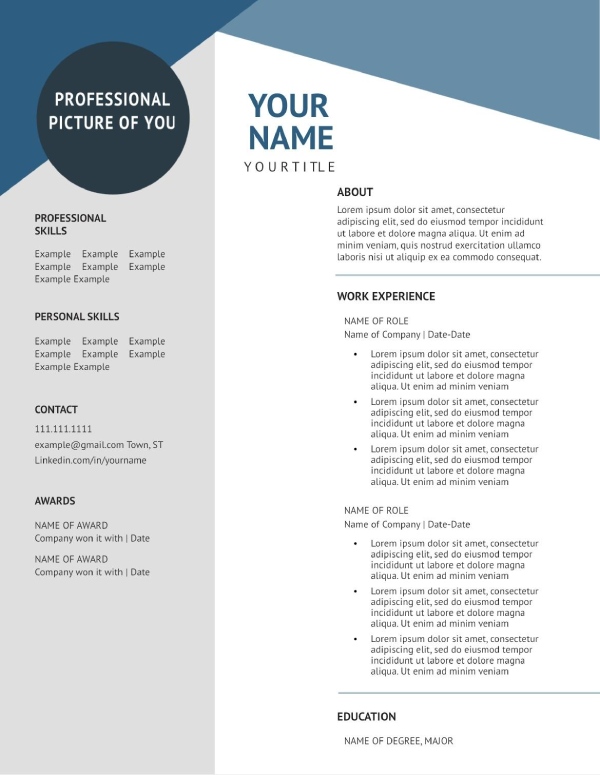The purpose of a real estate interview is for both a brokerage and an agent to determine if they can successfully work together. For new and experienced real estate agents, learning how to prepare for a real estate job interview is essential to ensure the right fit. You’ll need a resume demonstrating your expertise, and you’ll need to plan for real estate agent interview questions, dress for success, and be prepared to ask your own questions.
Read along as I help you prepare for a real estate job interview and get hired at the brokerage firm you want to work for.
Step 1: Create Your Real Estate Resume
The first crucial tip in our real estate interview guide is to create a well-written real estate resume before any interviews. A strong resume is the best way to showcase your professionalism and expertise and leave a positive impression on real estate brokers. Printing multiple copies of your resume to bring to interviews is advisable, especially if you anticipate interviewing with multiple individuals.
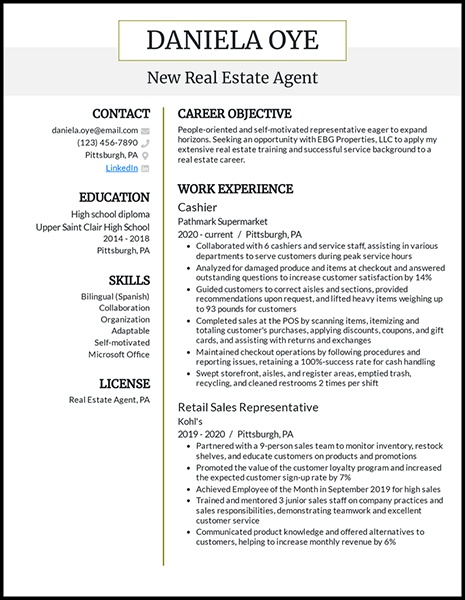
New real estate agent resume (Source: beamjobs.com)
Your resume should include the following:
- Name and contact information: Your name and contact information should stand out on your resume layout because your contact information helps you build a pipeline of clients for your business. Those reading your resume may be looking at multiple candidates, and it can be easy for them to confuse your unique qualities with someone else if your name isn’t prominent on the page.
- Job history and experience with sales, marketing, and lead generation: Simply naming your real estate company isn’t enough to persuade employers to work with you. Highlight the most relevant elements of your past employment, like sales, marketing, technology, and communicating with clients.
- Accomplishments and awards: Be specific about your accomplishments using hard numbers and data. By including specific numbers, the reader can easily understand the scope of your achievements.
- Education: Indicate where you received any college or professional degrees. Include any leadership positions you held while in school and extracurricular activities. Even if your education is not sales or real estate-related, showcasing your education is important in displaying your background to a potential broker or client.
- Skills: Real estate is an industry that isn’t dependent on higher education, and anyone with the right work ethic and strategy can gain massive success. This is why it’s crucial to have a “skills” section where you can bring attention to the specific qualities you bring to a new role.
- Certifications: Your credentials prove that you’ve made an effort to gain experience and education to constantly improve your skills, and they go a long way toward proving your authority. Don’t forget about continuing education or professional development classes. Include relevant classes or certifications in digital marketing, public speaking, finance, or other relevant topics.
These resume templates, offered by our experts at Fit Small Business, are designed with simplicity, clarity, and organization in mind. They are divided into five sections: contact information, summary, education, technical skills, and experience. Notably, your name is prominently displayed in a larger header, effectively highlighting it and making it more memorable to those reviewing your resume.
Template 1
Template 2
As seen in these examples, experienced agents can showcase their sales performance throughout their careers. In contrast, new agents can highlight sales-related experience and skills, even if they are not directly related to real estate. While sales performance is important, most brokers value hard work, a growth mindset, and excellent client service.
To guide you on how to prepare for a real estate job interview, we’ve compiled essential tips for creating a standout resume that will set you apart from the competition:
- Choose a scannable resume layout: Most people naturally scan a resume before actually reading the details, so starting with a clean, organized layout is key. Use bullet points, spaces between lines or sections, text styles (bold, italics, and underlines) to highlight sections or headings, large font for titles and headings, graphic elements to separate sections, and bold colors to draw attention to items you’d like to showcase.
- Start with a summary: A great summary should only be a few sentences long and provide context about your background and what’s unique and valuable about you. You can call it a “career summary” or “real estate profile” or leave it without a label.
- Use proper grammar and proofread your resume: Even with a beautiful and organized resume, multiple grammar mistakes or typos can make you look unprofessional. One proofreading trick to catch errors is to read the resume backward. You can also use spell check, Grammarly, or hire a professional proofreader or resume reviewer to look it over.
- Optimize your resume: Since brokers, clients, and partners will generally value different things, consider creating multiple versions of your resume to have on hand for every need. For example, potential listing clients will be more interested in your ability to sell properties for the best value, while brokers may want to know about your work ethic and certifications.
- Use tools to help create your resume: Creating a professional-looking resume can be a daunting task. Luckily, many tools and platforms are available to help you craft the perfect resume. These include Canva, 99designs, and Fiverr.
Step 2: Research the Real Estate Brokerage
Once you’ve got your resume ready and a few interviews lined up, the next crucial step in learning how to prepare for a real estate job interview is conducting thorough research on each company before your interview. During your real estate interview, the primary goal should be to ascertain whether the real estate brokerage aligns with your specific needs and business objectives.
Before the interview, learn more about how to choose a real estate brokerage to work for. Research everything you can about the company, considering its brand, reputation, and agent benefits. Assess how each brokerage caters to their agents’ unique needs and experience levels, such as providing training and mentorship for new agents or marketing and lead generation tools for seasoned agents. This research will aid in evaluating and formulating the right questions to ask in a real estate interview.
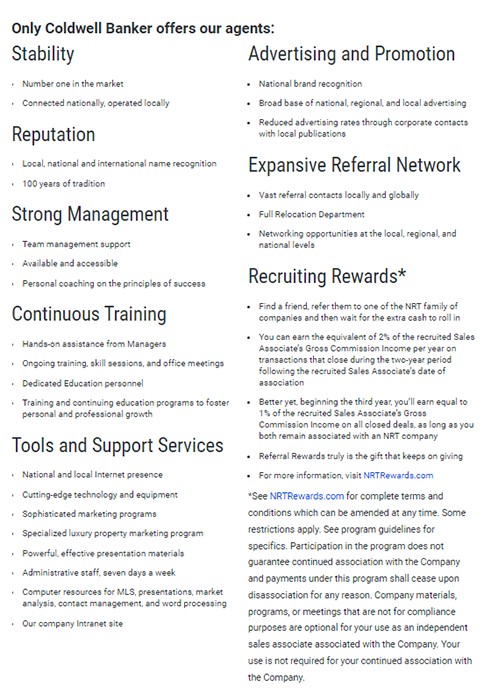
Coldwell Banker Realty agent benefits (Source: Coldwell Banker Homes)
For instance, if you find the company active on Facebook or Instagram, you can ask about its social media, real estate branding, and lead generation strategies and successes. This insight can shed light on the company’s organization, systems, and potential learning opportunities for you.
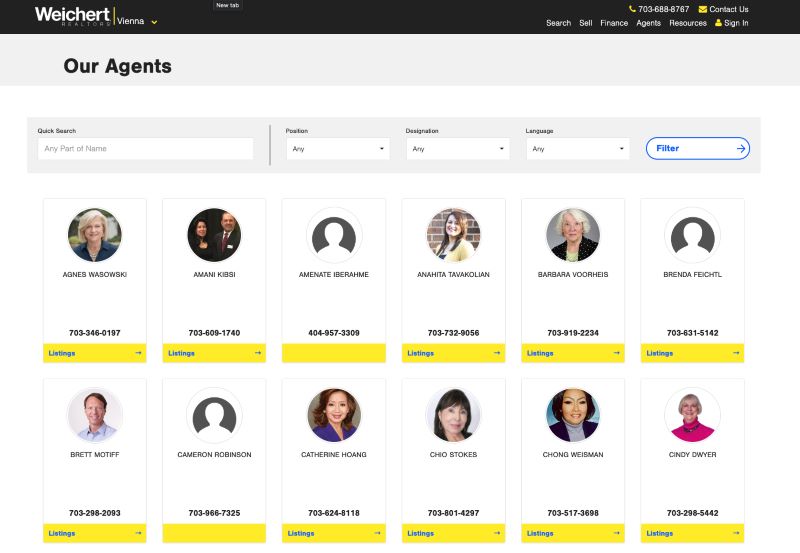
Contact details and listings of Weichert agents (Source: Weichert)
Some companies offer abundant online information, including customer reviews, agent profiles, active social media pages, and even commission details for new agents. In contrast, others provide limited online insights but don’t dismiss them. Instead, be extra thorough during the interview to learn more about the pros and cons of working with that brokerage.
Step 3: Determine the Questions You Plan to Ask the Brokerage
As you research each real estate brokerage, you’ll naturally think of some questions to ask during the interview. Write down any specific thoughts, questions, or concerns you develop during your research so you can discuss those openly with the broker. In addition, plan on some specific questions to ask brokers when interviewing them.
A few questions we recommend asking during your realtor interview include:
- How many agents at this brokerage work part-time and full-time?
- What is the average income of your agents?
- Does your brokerage host social gatherings?
- What are the brokerage’s short and long-term goals?
- What kind of training and mentorship opportunities are offered?
- What kind of software or technology is provided?
- What is the commission split structure?
Step 4: Prepare for Potential Real Estate Interview Questions to Answer
During your real estate broker interviews, demonstrating a strong understanding of the industry is crucial for making a lasting impression on the brokerages and companies you engage with. Therefore, meticulously preparing for interview questions in real estate is essential. Being well-versed in real estate terminology, having a thorough knowledge of the current real estate market, and being familiar with the entire transaction process can significantly highlight your value to any brokerage.
Also, regardless of whether you work in a large or small community, you’ll likely interact with members of the brokerages you interview with during future real estate transactions. Some common real estate job interview questions may include:
Question 1
❓Why did you become (or are becoming) a real estate agent?❓
Answer from a new agent: I decided to become a real estate agent because I’ve always been fascinated by helping people find their dream homes and being part of such an important life decision. I enjoy working with others and believe that real estate is a field where I can utilize my interpersonal skills to make a positive impact on clients’ lives. Additionally, the potential for a flexible schedule and the opportunity to continuously learn about the market were appealing factors for me.
Answer from an experienced agent: I have always had a passion for real estate and assisting people in finding their dream homes. I find it fulfilling to sell properties and assist buyers in locating the perfect place that they can call home.
Question 2
❓What are your sales goals?❓
Answer from a new agent: As a newly licensed real estate agent, my primary goal is to establish myself in the industry and build a solid foundation. In the short term, I aim to complete at least three successful transactions within my first six months to gain valuable experience and build a client base. My focus will be on providing exceptional service and gaining referrals from satisfied clients.
Over the long term, I aspire to increase my sales volume and grow my business gradually. While I don’t have specific monetary figures at this early stage, I’m committed to continuous improvement and will set more concrete goals as I gain experience and a better understanding of the market.
Answer from an experienced agent: I aim to become your company’s top sales agent. In my previous brokerage, I successfully earned a gross commission income of [insert amount] over the last year, and I completed [insert number] transactions. I’m confident that I can increase my sales volume and accomplish this goal by applying the same dedication and expertise I’ve honed over my career.
Question 3
❓What makes you stand out from other agents?❓
Answer from a new agent: As a newly licensed real estate agent, I recognize that I may not have the extensive experience of some other agents. However, I believe there are several qualities and approaches that set me apart. I have a fresh perspective, a strong willingness to adapt and learn, excellent communication skills, and local market knowledge. Additionally, I am tech-savvy and energetic, which helps me stay on top of the latest trends and developments in the industry.
Answer from an experienced agent: As a real estate agent, I consider my exceptional communication skills, comprehensive understanding of the market, and keen attention to detail my unique selling points. With extensive experience in this field, I am always willing to go above and beyond to ensure my clients’ satisfaction.
Question 4
❓How do you generate leads?❓
Answer from a new agent: As a newly licensed agent, I plan to employ various strategies to build my client base. This includes networking, growing an online presence, conducting open houses, collaborating with experienced agents, cold calling, referrals from family and friends, and attending real estate events or seminars.
Answer from an experienced agent: I use a well-rounded approach to lead generation. I tap into my existing network for referrals. I maintain an active online presence through social media and my website. I also create valuable content and participate in local networking events. In addition, I engage in direct marketing campaigns and build partnerships with local businesses. Online advertising and open houses are part of my strategy too. I keep an organized client database and invest in ongoing education to stay up-to-date. My approach is proactive, adaptable, and focused on providing excellent service to potential clients.
Question 5
❓How do you use the internet for your business?❓
Answer from a new agent: As a newly licensed agent, I plan to leverage the internet by creating my own professional website, growing an active social media presence, and using reputable listing websites. I also plan to leverage email marketing, digital advertising, and content creation.
Answer from an experienced agent: I market my properties and attract potential buyers through various channels such as Facebook, Instagram, and my personal website. Once I upload a new listing, I send text messages to my active home seekers. I also make sure to follow up promptly using my chosen message apps. My homes are staged and photographed by a top-notch videographer and photographer who produces virtual tours. One of my homes was sold within a week of listing and was shared 120 times on Instagram. I keep a tab on my website traffic and modify listing descriptions that are not performing well compared to others.
Question 6
❓How do you market your listings?❓
Answer from a new agent: As a newly licensed real estate agent, I’ll employ various marketing strategies to effectively promote my listings and attract potential buyers. I plan to market my listings through high-quality photography and videography, virtual tours, online listings, social media promotion, and open houses.
Answer from an experienced agent: I use various strategies to market listings, including social media, personal and third-party websites, print media, and through open houses.
Question 7
❓How do you handle difficult clients?❓
Answer from a new agent: I plan to handle difficult clients by actively listening, empathizing with their situation, and staying calm and professional. I will make an effort to clarify what the client expects from me and ensure we’re on the same page. Then, I will work with the client to identify potential solutions. When difficulties persist, I will involve a mentor or a more experienced colleague within the brokerage to help facilitate a resolution. Ultimately, my approach to handling difficult clients will be to maintain professionalism, open communication, and a willingness to find solutions while keeping the best interests of my clients in mind.
Answer from an experienced agent: When handling difficult clients, my approach is to maintain a professional, calm, and empathetic demeanor. I actively listen to their concerns and try to identify the optimal solution that satisfies everyone’s requirements. Furthermore, I ensure that I am transparent and provide all the information required to make an informed decision.
Question 8
❓How do you stay organized during a real estate transaction?❓
Answer from a new agent: As a newly licensed real estate agent, I plan to implement the following strategies to maintain organization: utilizing a customer relationship management (CRM) system, checklists, file management, calendar reminders, and other apps or software that help streamline transactions.
Answer from an experienced agent: I have a well-established system to follow to stay organized during a transaction. First, I create a transaction checklist outlining all the essential steps and deadlines—ensuring no crucial details are overlooked. I also utilize CRM systems and project management apps to keep all transaction-related documents, emails, and notes in one place, making it easy to access information quickly. Lastly, I set up reminders and alerts for important deadlines and appointments, allowing me to stay on top of important dates.
Question 9
❓How do you make a home more sellable?❓
Answer from a new agent or experienced agent: To make a home more sellable, I will ensure it is well-maintained, staged well for open houses and viewings, priced competitively, and advertised through multiple channels.
Question 10
❓What do you think are the three most important qualities of a successful real estate agent?❓
Answer from a new agent: I believe the real estate industry demands a combination of various qualities, but the three most important qualities for a successful real estate agent are strong communication skills, exceptional customer service, and market knowledge and adaptability.
Answer from an experienced agent: The three most important qualities of a successful real estate agent are, first, effective communication skills. An agent should be able to actively listen to their clients, understand their needs, and provide information clearly and promptly. This helps build trust and ensures clients are well-informed throughout the process. Secondly, adaptability. The real estate market is constantly evolving, and agents must be flexible and open to new strategies. They should be able to adapt to changing market conditions and emerging technologies to stay ahead of the competition. Lastly, I am a good negotiator. Successful agents excel in negotiation, securing the best deals for their clients in buying or selling transactions while ensuring all parties involved are satisfied with the outcome.
If you work with a real estate client niche like commercial real estate or 65-plus communities, you should also prepare for some more specific questions. For example, commercial real estate interview questions might focus more on your professional network, past deals, and your understanding of business finances.
Step 5: Dress for Success
Another real estate agent interview tip is to ensure you’re properly attired for your interviews. Making a positive impression is key, and formal business attire, such as a button-up shirt and tie, jacket, dress pants, or a dress skirt, is generally a safe bet. When choosing what to wear for your interview, keep in mind that your outfit should not only reflect the brokerage’s brand but also meet the professional standards of the real estate industry.
One effective strategy to understand the expected dress code is to check the brokerage’s website or social media pages. This can give you insight into whether the company has a more relaxed attire policy, where jeans and a nice shirt are acceptable. However, when uncertain, opting for formal wear is advisable. Adhering to these real estate interview tips can significantly influence how you’re perceived and increase your chances of success.

Keep it simple yet professional by pairing a button-down with well-structured trousers. (Source: Pinterest/Pinterest)
It is crucial to adhere to the real estate company’s dress code. To ensure you are on the right track, look at any realtor’s clothes and agent headshots posted on the brokerage’s website or social media pages and model your wardrobe accordingly. For example, if the brokerage you’re interviewing with recently posted a photo like this one from Schmitz & Smith Group, consider dressing in black and pink to show how you fit with their brand.

Schmitz and Smith Group (Source: Instagram)
Step 6: Engage in Post-interview Follow-up Practices
Post-interview follow-up is essential as it demonstrates your enthusiasm and professionalism and keeps you in mind with the hiring managers. Mastering the art of follow-up is one of the key real estate job interview tips that can significantly enhance your chances of landing your dream job in real estate. Below are some suggestions:
- Send a personalized thank-you note: Immediately after the interview, send a personalized thank-you note to each interviewer. Mention specific details discussed during the interview to show your attentiveness and interest. This gesture is polite and reinforces your enthusiasm for the role.
- Showcase your value through follow-up communications: Use follow-up communications to underscore how your skills and experiences align with the company’s needs. If, during the interview, you discussed challenges the company is facing, consider sending additional information or ideas on how you can help address these challenges, demonstrating your proactive approach and problem-solving skills.
- Leverage social media professionally: Connect with the company and the interviewers on professional social networks like LinkedIn. This keeps you on their radar and shows your interest in being a part of their professional community. However, ensure your social media profiles are professional and reflect your qualifications in real estate.
- Ask strategic questions: If feedback has not been provided after a reasonable period, follow up with an email reiterating your interest in the position and asking for an update. Include some strategic questions about the role or the company’s future directions. For example, ask about the company’s strategy for overcoming current market challenges or how the role you interviewed for contributes to the company’s goals. Asking insightful questions shows your deep interest, strategic thinking, and eagerness to contribute from day one.
Other Next Steps
- Prepare for different outcomes: While you hope for positive news, be mentally prepared for any response. If not selected, use this as a learning opportunity and ask for feedback on areas for improvement.
- Continue networking: Regardless of the outcome, maintain the relationships you’ve built during the interview process. The real estate industry is tightly knit, and a strong network can open doors to future opportunities.
- Reflect and refine: Use the experience to refine your interview techniques and follow-up strategies. Consider how you can improve the questions to ask at a real estate interview or how you present your value proposition to potential employers in future interviews.
Frequently Asked Questions (FAQs)
When discussing why you want to work in real estate, being truthful and passionate is an essential interview tip for real estate jobs. Your answer may be straightforward, such as desiring the ability to spend more time with your loved ones. It may not be practical to disclose that you wish to work fewer hours, but expressing the desire for independence may be better and more easily understood.
Yes, you should bring your resume to a real estate interview. Even if you have already submitted it online, bringing a physical copy shows you are prepared and professional. It also allows you to reference specific details during the interview and highlight your qualifications and experiences.
To sell yourself in a real estate interview, it’s important to highlight your relevant skills and experience. Emphasize your communication and negotiation skills, market knowledge, customer service, adaptability, and problem-solving abilities. Additionally, showcase your enthusiasm for the job and the industry, and be prepared to ask insightful questions that demonstrate your interest and strategic thinking.
Bottom Line
To find success in real estate, you must choose the right real estate brokerage to work for and learn how to prepare for real estate job interviews. By thoroughly preparing for your interview with brokers, you’ll be able to clearly communicate your needs and confidently answer—and ask—questions. Knowing how to prepare for a real estate job interview is one of the first steps to starting and continuing a successful real estate career.
